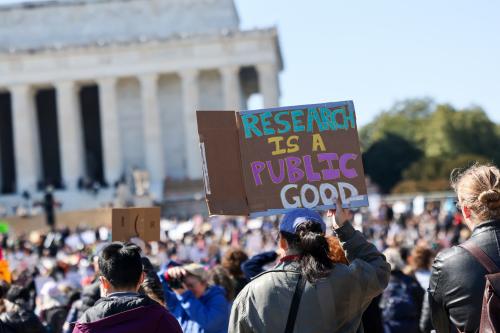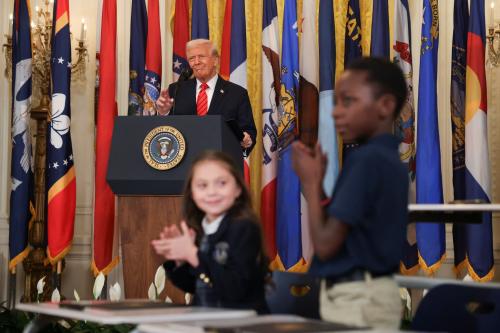The White House has announced its plan to grant waivers of the provisions of No Child Left Behind (NCLB) to states that agree to put in place the education reforms favored by the administration. Thus states that agree, for example, to adopt the Common Core state standards for what students should learn and to evaluate teachers for tenure based on student test gains will be freed from the consequences facing schools that fail to meet adequate yearly progress goals under NCLB. The reforms the administration seeks as a condition of granting waivers are the same that it put forward in its Blueprint for reauthorizing NCLB, and that it advanced in its Race to the Top competition using the $5 billion in discretionary funds made available to it by Congress under the Stimulus Act.
There is no question that schools are being over-identified by NCLB as requiring intervention. Whether the proportion is the hyperbolic 80% predicted by Secretary Duncan or half that, as seems more likely, states and districts cannot handle that many schools being branded as needing improvement, either administratively or politically. Something needs to be done if the whole accountability system isn’t to be seen as a joke and its provisions widely flaunted. If Congress won’t or can’t act, then it is reasonable for the administration to indicate that it invites waiver requests. NCLB clearly grants the secretary of education the authority to grant waiver requests from states that can successfully propose alternative means of improving the quality of instruction and enhancing student achievement.
It is one thing for an administration to grant waivers to states to respond to unrealistic conditions on the ground or to allow experimentation and innovation. Similar waiver authority has been used to advance welfare and Medicaid reform going back to the Reagan administration, and to allow a few districts and states to experiment at the margins of NCLB in the Bush administration. It is quite another thing to grant state waivers conditional on compliance with a particular reform agenda that is dramatically different from existing law. The NCLB waiver authority does not grant the secretary of education the right to impose any conditions he considers appropriate on states seeking waivers, nor is there any history of such a wholesale executive branch rewrite of federal law through use of the waiver authority.
The administration is surely counting on the support of the congressional delegations of individual states to support the waiver request from their state. And with the majority of states likely to submit waiver requests, the administration may well have the political clout it needs to overcome the ire of key committee chairs whose authority to legislate has been undercut.
If you’re a fan of greater presidential control of education (and domestic policy in general), it’s celebration time. If you like the separation of powers or thought that the reauthorization of NCLB might be an opportunity to put more control of schooling in the hands of parents at the expense of district, state, and federal bureaucracies, this is not your party.
The Brookings Institution is committed to quality, independence, and impact.
We are supported by a diverse array of funders. In line with our values and policies, each Brookings publication represents the sole views of its author(s).




